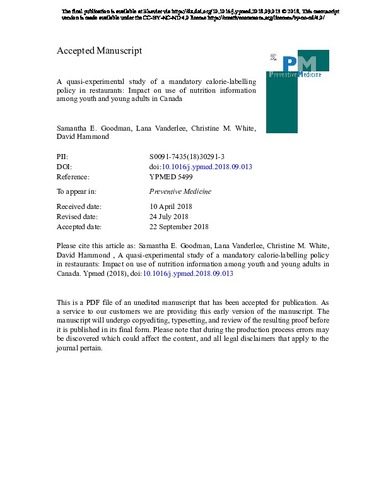| dc.contributor.author | Goodman, Samantha | |
| dc.contributor.author | Vanderlee, Lana | |
| dc.contributor.author | White, Christine M. | |
| dc.contributor.author | Hammond, David | |
| dc.date.accessioned | 2018-11-14 16:43:29 (GMT) | |
| dc.date.available | 2018-11-14 16:43:29 (GMT) | |
| dc.date.issued | 2018-11-01 | |
| dc.identifier.uri | https://dx.doi.org/10.1016/j.ypmed.2018.09.013 | |
| dc.identifier.uri | http://hdl.handle.net/10012/14126 | |
| dc.description | The final publication is available at Elsevier via https://dx.doi.org/10.1016/j.ypmed.2018.09.013 © 2018. This manuscript version is made available under the CC-BY-NC-ND 4.0 license https://creativecommons.org/licenses/by-nc-nd/4.0/ | en |
| dc.description.abstract | In 2017, Ontario became the first Canadian province to require calorie amounts on menus/menu boards of chain restaurants. The province of British Columbia (BC) implemented a voluntary nutrition information initiative in which calorie and sodium information were available upon request. A quasi-experimental design was used to examine the use of nutrition information in Ontario (mandatory calorie labelling), compared to BC (voluntary policy) and three other provinces with no formal menu labelling policy (‘control’). Data were collected from youth and young adults (16–30 years) in all provinces pre- (fall 2016; n = 2929) and post- (fall 2017; n = 968) implementation of Ontario's calorie-labelling policy in January 2017. Generalized estimating equations tested differences between provinces over time in noticing and impact of nutrition information and support of mandatory calorie labelling. Noticing of nutrition information in restaurants increased in Ontario significantly more than in BC (+25.1% vs. +1.6%; AOR = 4.26, 95% CI = 2.39–7.61) and control provinces (+6.5%; AOR = 3.00, 95% CI = 1.91–4.73). Ontario respondents were significantly more likely to report that the nutrition information influenced their order than those in BC (+12.9% vs. +2.2%; AOR = 3.53, 95%CI = 1.61–7.76) and control provinces (+2.0%; AOR = 3.71, 95%CI = 1.87–7.36). Policy support increased in all groups at follow-up, with a significantly greater increase in Ontario than control provinces (+12.9% vs. +5.7%; AOR = 1.57, 95%CI = 1.06–2.34). Socio-demographic differences were also observed. Findings suggest that the mandatory menu labelling policy implemented in Ontario has increased noticing and use of nutrition information, with no evidence to support the effectiveness of voluntary policies that require consumers to request nutrition information. | en |
| dc.description.sponsorship | Public Health Agency of Canada | en |
| dc.language.iso | en | en |
| dc.publisher | Elsevier | en |
| dc.rights | Attribution-NonCommercial-NoDerivatives 4.0 International | * |
| dc.rights.uri | http://creativecommons.org/licenses/by-nc-nd/4.0/ | * |
| dc.subject | Youth | en |
| dc.subject | Restaurants | en |
| dc.subject | Young adult | en |
| dc.subject | Legislation | en |
| dc.subject | Food labelling | en |
| dc.subject | Diet, food and nutrition | en |
| dc.subject | Food services | en |
| dc.subject | Government regulations | en |
| dc.subject | Public health | en |
| dc.title | A quasi-experimental study of a mandatory calorie-labelling policy in restaurants: Impact on use of nutrition information among youth and young adults in Canada | en |
| dc.type | Article | en |
| dcterms.bibliographicCitation | Goodman, S., Vanderlee, L., White, C. M., & Hammond, D. (2018). A quasi-experimental study of a mandatory calorie-labelling policy in restaurants: Impact on use of nutrition information among youth and young adults in Canada. Preventive Medicine, 116, 166–172. doi:10.1016/j.ypmed.2018.09.013 | en |
| uws.contributor.affiliation1 | Faculty of Applied Health Sciences | en |
| uws.contributor.affiliation2 | School of Public Health and Health Systems | en |
| uws.typeOfResource | Text | en |
| uws.typeOfResource | Text | en |
| uws.peerReviewStatus | Reviewed | en |
| uws.scholarLevel | Faculty | en |


